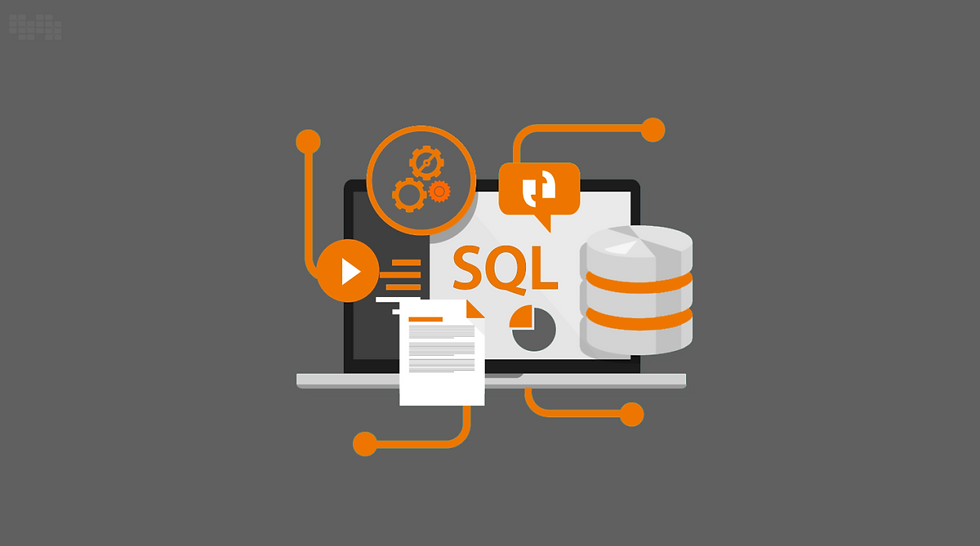Getting Started with SQL: A Step-by-Step Guide
- kaushiklalit117
- Apr 23, 2024
- 4 min read
Introduction to SQL
Structured Query Language (SQL) is a powerful tool used for managing and manipulating relational databases. Whether you're a data analyst, a software developer, or a business owner, understanding SQL is essential for effectively working with data. SQL allows you to store, retrieve, and manipulate data with ease, making it a fundamental skill in the world of data management.

Setting up SQL Environment
Before diving into SQL, you need to set up your environment. This involves choosing a suitable database management system (DBMS) and installing the necessary software. Popular choices for DBMS include MySQL, PostgreSQL, Microsoft SQL Server, and SQLite. Once you've selected a DBMS, follow the installation instructions to configure your SQL server.
Basics of SQL
SQL syntax consists of a set of commands used to perform various operations on databases. The basic operations include creating databases and tables, inserting, updating, and deleting data. Understanding the syntax is crucial for writing SQL queries correctly. With SQL, you can define the structure of your databases and manipulate the data stored within them effortlessly.
Retrieving Data with SQL
One of the primary functions of SQL is retrieving data from databases. To get data from one or more tables according to predetermined criteria, use the SELECT command. You can filter and sort the retrieved data to obtain the desired results. Additionally, SQL allows you to perform basic calculations on the retrieved data, such as summing up values or calculating averages.
Advanced SQL Queries
As you become more proficient in SQL, you'll encounter more complex scenarios that require advanced querying techniques. Data can be retrieved from one or more tables using the SELECT statement depending on predetermined criteria. Aggregating data with GROUP BY enables you to perform calculations on groups of data. Subqueries are also useful for performing operations within other queries, making them indispensable for complex data manipulations.
Managing Databases and Tables
In addition to querying data, SQL allows you to manage the structure of your databases and tables. You can modify table structures by adding or removing columns, changing data types, or altering constraints. Indexing is another crucial aspect of database management, as it improves query performance by allowing for faster data retrieval. It's also essential to regularly back up your databases to prevent data loss and restore them in case of emergencies.
Securing SQL Environment
Security is paramount when working with databases, as they often contain sensitive information. SQL provides various mechanisms for securing your environment, including user authentication and authorization. Implementing access controls ensures that only authorized users have access to specific resources. It's also essential to guard against SQL injection attacks, a common security vulnerability in web applications that can compromise your database.
Best Practices and Tips
To make the most out of SQL, it's essential to follow best practices and tips for writing efficient queries and optimizing database performance. This includes properly indexing your tables, avoiding unnecessary joins, and optimizing your queries for speed. Maintaining data integrity is also critical, ensuring that your databases remain accurate and consistent over time.
Resources for Learning SQL
Fortunately, there are plenty of resources available for learning SQL, regardless of your skill level. Online tutorials and courses offer interactive learning experiences, while books and reference materials provide in-depth explanations of SQL concepts. Additionally, practice exercises and challenges allow you to apply your knowledge and hone your skills in a hands-on manner.
Conclusion
Embarking on your SQL journey might feel intimidating initially, yet with the appropriate resources and guidance, such as The Best Data Analytics Training in Bhopal, Indore, Gwalior, Agra, Delhi, Noida, and all cities in India, you'll swiftly master the art of managing and manipulating databases. This comprehensive guide provides a structured approach to learning SQL, ensuring that you grasp the fundamentals and progress steadily. Through consistent practice and application of the concepts outlined here, you'll gain confidence in crafting intricate SQL queries. Soon enough, you'll unlock the immense potential of your data, enabling you to extract valuable insights and make informed decisions. With SQL expertise under your belt, you'll be equipped to tackle various data-related challenges effectively. Whether you're a novice or seeking to enhance your skills, this guide serves as a reliable companion on your SQL learning journey. Embrace the opportunity to delve into the world of SQL and harness its power to transform raw data into actionable intelligence.
FAQs
1. Is SQL difficult to learn for beginners?
Learning SQL can be challenging initially, but with dedication and practice, it becomes easier over time.
2. Which DBMS is best for beginners?
MySQL and SQLite are popular choices for beginners due to their ease of use and extensive documentation.
3. Can I learn SQL online for free?
Yes, there are many free online resources available for learning SQL, including tutorials, courses, and interactive platforms.
4. How long does it take to become proficient in SQL?
The time it takes to become proficient in SQL varies depending on your learning pace and prior experience with programming and databases.
5. Is SQL still relevant in today's technology landscape?
Yes, SQL remains a crucial skill in data management and analysis, with many organizations relying on relational databases for storing and querying data.

